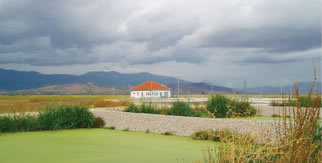
Management, Economics and Policy
Sustainable Water Resources Management Volume 1:
Executive Summary
Publication Date: January 2010
Cooperating Institution: Electric Power Research Institute (EPRI)
Principal Investigator: Bob Goldstein
Project Budget: $181,998
Project Identifier: DEC6SG06
DESCRIPTION
This report summarizes the findings of a three-phase research project investigating sustainable water management. The report will be of value to all parties interested in the water aspects of sustainable development. As it contains information at various scales of water management, the report will be of interest for those involved with green building projects, the public water supply, stormwater management, wastewater treatment, and the electric power sector. In addition, the report provides valuable insight for government agencies involved in water regulation and policy.
The overall report is divided into three volumes. Volume 2 and 3 are detailed reports of the two major phases of the study. Volume 2 evaluates the relationship among green building practices, green building rating systems, and water resource sustainability. The evaluation is based on case studies of three diverse commercial green building projects. Volume 3 explores what is known as the “new paradigm” for water resource management at the community level. This paradigm is built around the concept of water resource sustainability. Volume 3 is based on a workshop that reviewed the water management practices and strategies of two very different communities. This volume, Volume 1, summarizes the other two volumes as well as two meetings of the advisory committee to the overall study.
This body of work illuminates the need to work across current boundaries to achieve the most sustainable outcomes. As illustrated by the green building case studies, the outcomes for a project are better when driven by local water priority issues rather than by a green building rating system based on universal criteria. Likewise, more sustainable approaches to water management at the local level can be achieved when the plan includes stakeholders involved with all facets of water—supply, use, treatment, stormwater management. Oftentimes, the best approaches are contradictory to one or more existing regulations, codes, rules, or rating systems that do not take into account new technologies and practices and limitations on water availability.
As many of the current approaches to water management become unsustainable, it is becoming increasingly important to look for innovative solutions that may be drastically different than the current management paradigm. To truly implement best practices, it is critical to bring together all stakeholders and to develop integrated approaches. Implementation of sustainable approaches may require more geographically specific or project specific plans and guidelines than are currently supported by many regulatory and green-building rating systems. Future efforts should continue to focus on practical means for replacing non-sustainable practices and institutional approaches with new ones more in line with an ever-changing environment. The electric sector needs to understand the perspectives of the water sector and work to create and test new collaborative water resource management approaches to achieve energy/water sustainability.

